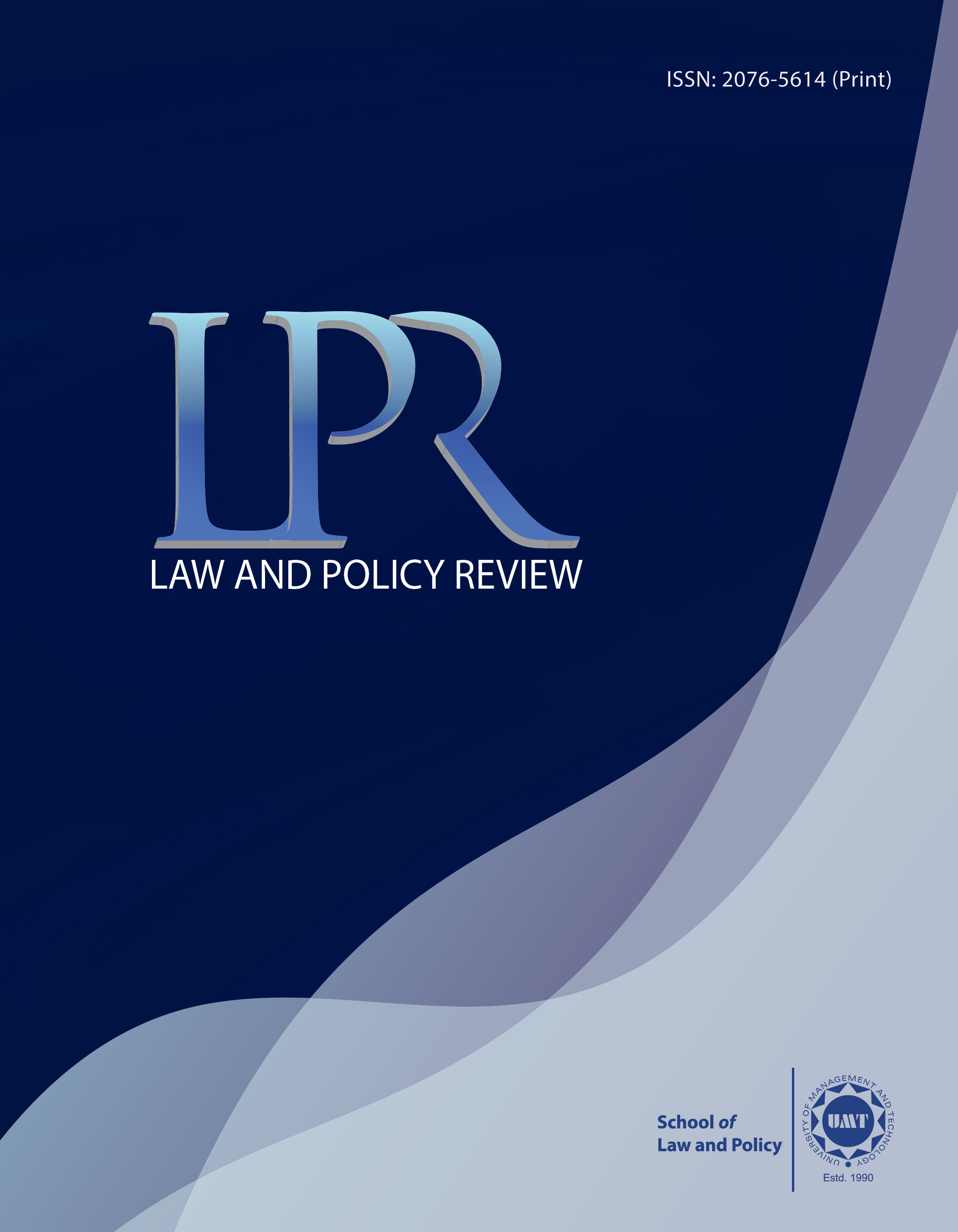Enforcement of Foreign Arbitral Awards: A Critical Study of Pakistan's Current Arbitration Regime
Abstract
 Abstract Views: 122
Abstract Views: 122
This study critically examines the enforcement of foreign arbitral awards in Pakistan. There are two primary enactments that deal with the procedures of arbitration. The first is the Arbitration Act, 1940. The second enactment that deals with the process of arbitration is Foreign Awards (Recognition and Enforcement) Act, 1961. Despite the existence of these laws, it is still arduous to completely execute the awards in the country. Several studies have highlighted the difficulties faced by the parties in enforcing foreign arbitral awards in Pakistan, including lack of awareness and understanding of the arbitration process, limited number of specialized arbitration courts, lengthy court procedures, and lack of effective enforcement mechanisms. This study aims to identify difficulties in the enforcement of arbitral award and suggest potential solutions for improving the process of execution. For this purpose, it relies upon a review of the relevant literature and statutes and also includes a case study analysis of several selected cases.
Downloads
References
Ahmad, R. (2018). A comparative study of the arbitration laws of Pakistan and India. Journal of International Commercial Law and Technology, 13(2), 45–54.
Ahmed, A. (2015). The effectiveness of the arbitration regime in Pakistan: A study of selected cases. Journal of International Dispute Settlement, 6(1), 1–20.
Ahmed, N. (2019). The role of expertise in the appointment of arbitrators in Pakistan. Journal of International Commercial Law and Technology, 14(2), 35–45.
Ahmed, S. (2018). The enforcement of foreign arbitral awards in Pakistan: An analysis. Journal of International Arbitration, 35(5), 489–503.
Ali, S. (2017). The enforcement of foreign arbitral awards in Pakistan: A critical examination. Journal of International Dispute Settlement, 8(3), 559–574.
Ali, S. (2019). The current state of arbitration in Pakistan: A critical analysis. Journal of International Commercial Law, 14(3), 1–20.
Asian Development Bank (ADB). (2007). Enhancing the enforceability of foreign arbitral awards in developing countries. https://www.adb.org/sites/default/files/institutional-document/32215/psa-mon.pdf
Chaudhry, S. (2020). The arbitration regime in Pakistan: An overview. Journal of International Dispute Settlement, 11(2), 239–252.
Gupta, A. (2019). The evolution of arbitration law in India: A Critical Analysis. Journal of International Commercial Law and Technology, 14(3), 75–85.
Hassan, R. (2018). The limited scope of appeal under the Foreign Awards (Recognition and Enforcement) Act of 1961: A loophole in the implementation of foreign arbitral awards in Pakistan. Journal of International Arbitration, 35(2), 123–139.
Hussain, A. (2019). The enforcement of foreign arbitral awards in Pakistan: A comparative study. Journal of International Commercial Law and Technology, 14(2), 85–95.
Hussain, A., Ahmed, M., & Sheikh, A. (2019). Barriers to the effective implementation of foreign arbitral awards in Pakistan. Journal of International Arbitration, 36(1), 1–21.
International Centre for Settlement of Investment Disputes (ICSID). (2010). The Enforcement of Foreign Arbitral Awards in Developing Countries. https://icsid.worldbank.org/sites/default/files/parties_publications//C3765/Respondent's%20Counter-Memorial/Pi%C3%A8ces%20juridiques/RL-0020.pdf
International Chamber of Commerce (ICC). (2016). The Enforcement of Foreign Arbitral Awards: A Study of Selected Jurisdictions. https://cdn.iccwbo.org/content/uploads/sites/3/2016/11/icc-financial-institutions-and-international-arbitration-icc-arbitration-adr-commission-report.pdf
Khan, A. (2015). Enforcing foreign arbitral awards in Pakistan: Problems and prospects. Journal of International Commercial Law and Technology, 10(1), 1–10.
Khan, A. (2017). Arbitration in Pakistan: An overview. Journal of International Commercial Law and Technology, 12(1), 13–26.
Khan, M. (2016). The challenges of executing foreign arbitral awards against assets located outside of Pakistan. Journal of International Arbitration, 33(4), 239–255.
Khan, M. (2020). An examination of the enforcement of foreign arbitral awards in Pakistan: A case study analysis. Journal of International Dispute Settlement, 11(2), 327–345.
Qureshi, M. (2017). The enforcement of foreign arbitral awards in Pakistan: An empirical study. Journal of International Business and Economics, 22(1), 1–15.
Qureshi, M. (2018). The enforcement of foreign arbitral awards in Pakistan: Current challenges and future prospects. Journal of International Arbitration, 35(6), 561–574.
Raza, A. (2017). The lack of specialized institutions for the execution of foreign arbitral awards in Pakistan. Journal of International Arbitration, 34(3), 177–193.
Raza, A. (2019). The recognition and enforcement of foreign arbitral awards in Pakistan: An overview. Journal of International Commercial Law and Technology, 14(3), 125–135.
Shah, H. (2016). The Challenges of Enforcing Foreign Arbitral Awards in Pakistan: A Comparative Study. Journal of International Commercial Law, 11(2), 1–20.
Sharma, S. (2020). The impact of the amendments to the arbitration and conciliation act, 1996 on Indian commercial arbitration. Journal of International Commercial Law and Technology, 15(4), 55–65.
Tariq, H. (2018). Delays in the recognition and enforcement of foreign arbitral awards in Pakistan. Journal of International Arbitration, 35(4), 257–274.
The Arbitration Act, 1940 (Pakistan). https://www.ma-law.org.pk/pdflaw/Arbitration%20Act,%201940.pdf
Yakoob, N. (2018). Enforcing foreign arbitral awards in Pakistan: Challenges and solutions. Journal of International Arbitration, 35(1), 69–82.
Copyright (c) 2022 Abdullah Ghafoor, Rana Baleegh-Ur -Rehman, Rida Khawar, Sardar Omer Hassan Khan, muhammad ars

This work is licensed under a Creative Commons Attribution 4.0 International License.
LPR follow an open-access publishing policy and full text of all published articles is available free, immediately upon publication of an issue. The journal’s contents are published and distributed under the terms of the Creative Commons Attribution 4.0 International (CC-BY 4.0) license. Thus, the work submitted to the journal implies that it is original, unpublished work of the authors (neither published previously nor accepted/under consideration for publication elsewhere). On acceptance of a manuscript for publication, a corresponding author on the behalf of all co-authors of the manuscript will sign and submit a completed the Copyright and Author Consent Form.





